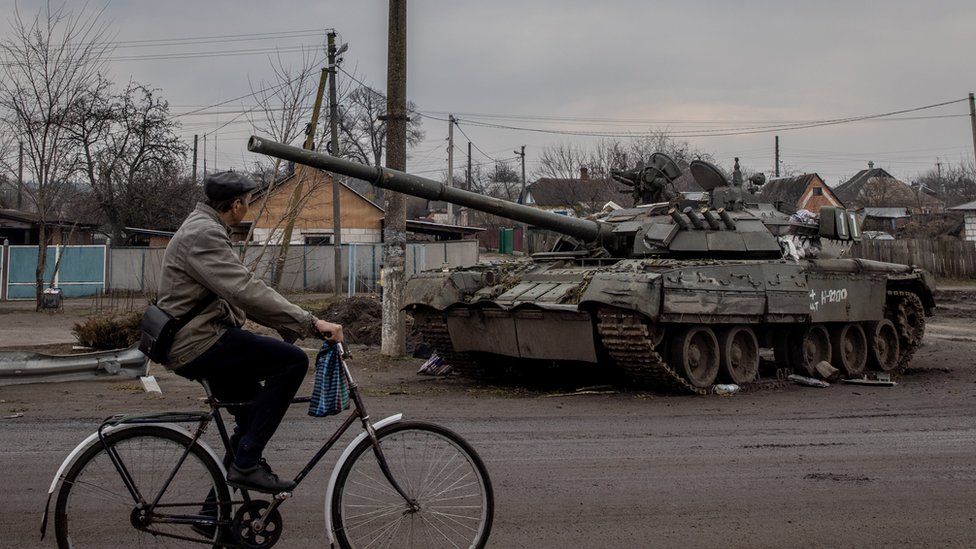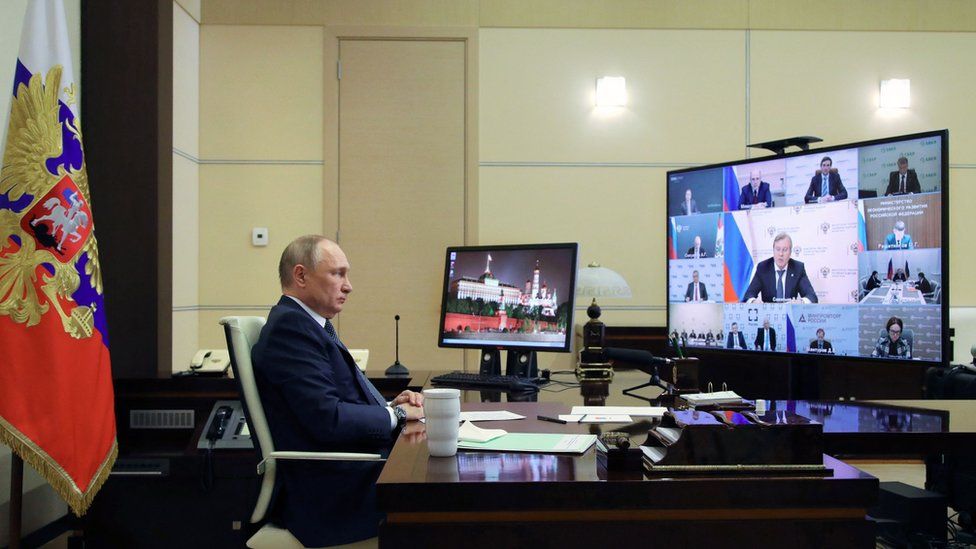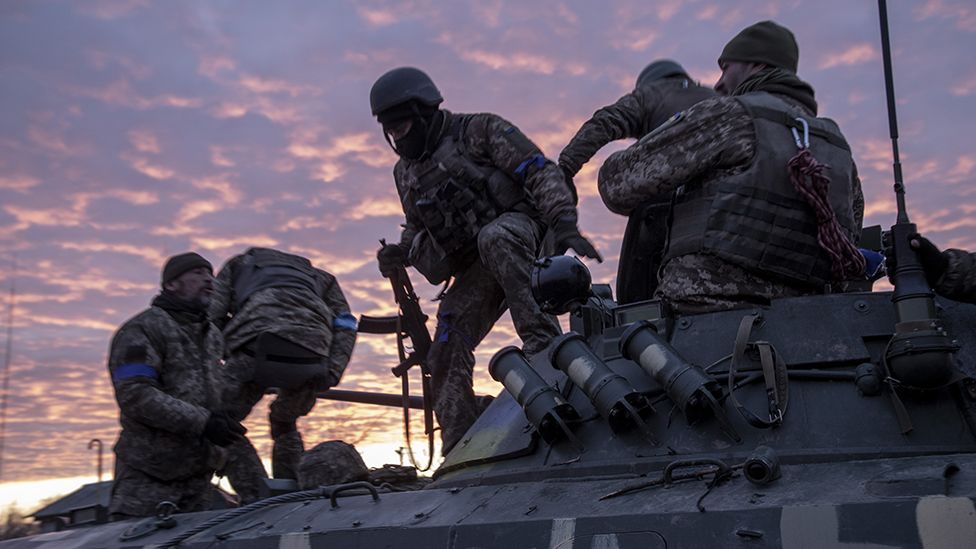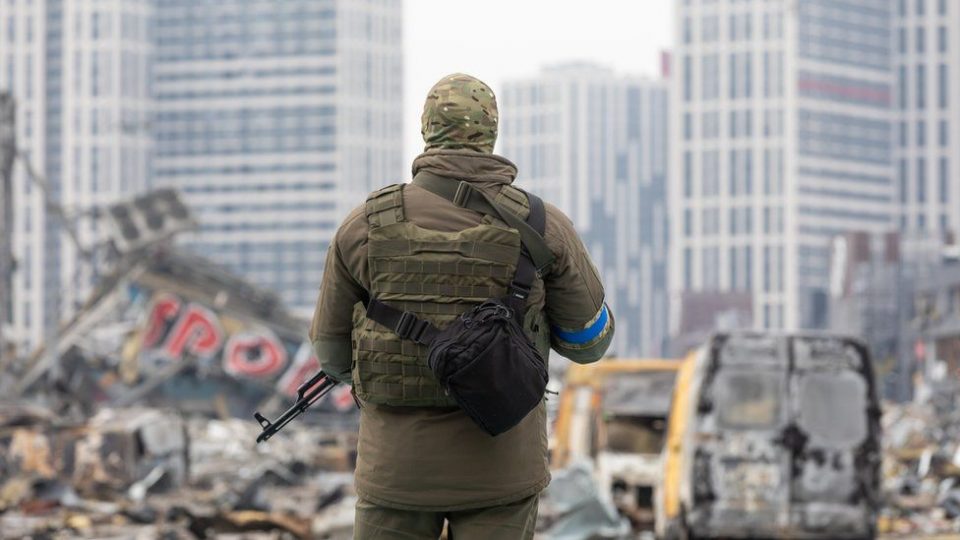Russia continues to face fierce resistance from Ukraine, more than a month into its invasion.
Ukrainian forces have begun attempts to retake some areas from Russia, which said this week it would scale back operations around Kyiv and the northern city of Chernihiv.
Meanwhile four million people have fled Ukraine, and a quarter of the country’s population is thought to be displaced.
Two of the BBC’s reporters on the ground answer your questions.
- Orla Guerin is in Kyiv, Ukraine’s capital
- Jenny Hill is in the Russian capital, Moscow
In light of the recent counter-attacks that Ukraine has undertaken, and assuming that diplomatic talks between Ukraine and Russia fail, is it possible that Ukraine may be able to “win” this war militarily? – Harry Tinsley
Orla Guerin writes:
In military terms it’s a case of so far, so good for Ukraine.
It has surprised President Putin, and the world, by mounting skilled and stubborn resistance against a larger, better equipped army. Equally, Russian forces have surprised the world by being disorganised and inept.
We saw an example of Ukraine’s success in battle at a frontline position outside Kyiv last week. Ukrainian forces told us the Russians had tried to break through four times in the past month, and each time had been held back. The evidence was there in the form of about a half dozen burnt-out Russian tanks and armoured personnel carriers.
Russia’s invasion is now in its sixth week, and it has failed on the key fronts – the Russians have not managed to enter the capital Kyiv, to topple the government, or to take any major city – bar Kherson – in the south. Russia has destroyed more than it has captured. That’s a poor return on a costly invasion.
That said, it’s too early to predict the outcome here.
We may be at the start of a long war. Russia says it will focus now on the Donbas region in eastern Ukraine. It may have little choice, having failed to make gains elsewhere. But in the future, it could resume trying to capture more territory elsewhere.
Mr Putin’s fate is probably tied to the success or failure of the invasion. He may continue to pour in troops, and armour and heavy weapons over the longer term.

With Russia recruiting from the Middle East, does this show a lack of confidence in the quality of its own forces? – David Carter
Jenny Hill writes:
The Kremlin would never admit to it, but there is evidence that at least some of the Russian troops are inexperienced and unprepared for their mission. The Ministry of Defence was recently forced to admit that – contrary to Mr Putin’s claims – conscripts had been sent to fight in Ukraine.
Moscow claims to have 16,000 Middle Eastern “volunteers”, many of whom fought against Isis in the last decade, ready to join Russian troops. They may have more experience than some of their Russian counterparts, and some experts say they’d probably be more skilled in the kind of urban combat necessary to take cities and towns.
Some argue too that they’d be less reluctant to attack or kill Ukrainian civilians (many Russians have close ties to Ukraine and consider the people there to be “brethren”), and that they have a reputation for brutality which could have a psychological effect on Ukrainian troops.
The Kremlin presumably knows all this, which is why it was so keen to publicise its access to Middle Eastern fighters – even though it has not yet officially confirmed that it will actually send them in.
To what extent will unexploded ordnance remain an issue for Ukraine after the war? Is there potential for large areas of land to be deemed inaccessible as a result? – Robbie
Orla Guerin writes:
Sadly yes, as so often in conflict, the danger to human life will remain long after the guns eventually fall silent.
The danger comes not only from unexploded ordnance, but also from landmines. They can kill for years to come, unless and until demining organisations can clear frontline areas. I have seen these organisations at work after other wars. Their work is painstaking, and time-consuming.
Before the invasion began, there was already a war raging in the east of the country between Russian-backed separatists and the government of Ukraine. It began in 2014, and has dragged on ever since.
While reporting from frontlines there in late January and February, we had to carefully skirt many minefields. At that time the snow was melting – turning the soil to mud. In these conditions, mines can easily shift from their original location (which may have been marked on maps or fenced off).
Currently in the commuter town of Irpin, north of Kyiv, the Ukrainian army says there is a high risk to life because of mines in the streets.
Is it getting more or less likely that the people in Russia will overthrow Mr Putin or cause greater civil unrest, the longer the conflict lasts? – Damien Fieldhouse, Somerset
Jenny Hill writes:
Less likely.
The Kremlin comes down hard on those who oppose the war and many Russians who think that way have fled. What were almost daily street protests have dwindled.
State opinion polls have to be viewed with some cynicism, but they consistently show majority (and growing) support for Mr Putin and for his “special military operation”.
Given that most independent Russian media outlets have been blocked or forced to close, there are few alternatives to state media, which sticks to the Kremlin narrative. That says that Russian troops have only gone into Ukraine to defend the Russian-speaking population from attacks and “genocide” perpetrated by Ukrainian nationalists and neo-Nazis.
If you only watched state TV, you might well conclude that this is indeed an honourable and necessary operation to save Russian speakers and Russia itself from an aggressive Ukraine which, with the help of America, is developing biological weapons and is desperate to get its hands on nuclear ones.
Sanctions are starting to have a noticeable effect with prices rising, but the Kremlin frames this as another example of Western aggression. At this stage it’s hard to see any public dissatisfaction evolving into revolution.

Who is going to pay to rebuild the damage inflicted on infrastructure in Ukraine – never mind the human cost? – Steve Sandercott, Rugby
Orla Guerin writes:
The greatest cost is the human one and that is increasing by the day. The verified civilian death toll, according to the United Nations, is about 1,200 people, but the real number will be far higher. Add to this the fact that four million Ukrainians have had to flee and become refugees in other countries.
There is also extensive physical destruction, in cities and towns across this vast country. Nowhere has suffered more than Mariupol in the south, where we spent 10 days in the countdown to the invasion.
At that point it was a bustling port city, with trendy cafes, busy restaurants, and families strolling in the parks. Satellite imagery of Mariupol now shows mostly scorched earth, with 90% of residential buildings damaged or destroyed.
As many as 5,000 people are known to have been killed in this city alone, according to Ukrainian officials. They say the actual death toll could be twice that.
Ukraine’s President Volodymyr Zelensky has promised to restore “every house, every street and every city”. He says Russia will have to “learn the word ‘reparations'” and pay the full cost.
Ukraine will certainly want reparations to be a key part of any deal done to end the war. If Russia pays – and how much – will depend on who has the upper hand when that deal is done. Theoretically, Russian assets abroad, frozen by G7 countries, could be used to help foot the bill.
If a peace deal were to happen, how would Ukraine/Russia deal with Crimea, the regions taken by Russia in the Donbas this past month, and the areas that have been controlled by Russian-backed rebels for the past few years? – Ryan McGauley
Jenny Hill writes:
We know that Mr Putin wants the world to recognise Crimea, which Russia annexed in 2014, as Russian. During negotiations earlier this week, the Ukrainian side suggested that Crimea’s status be negotiated over 15 years as part of an overall peace deal, although it’s hard to see Mr Putin agreeing to that.
He also wants the international community to recognise (as he has) the self-proclaimed peoples’ republics of Donetsk and Luhansk as independent (although this would basically mean “Russian-controlled”).
Given that the Kremlin’s current plan is to intensify its efforts in eastern Ukraine in order to “liberate” the whole Donbas region, we can assume that Mr Putin intends to try to take – and hold on to – the region.
We’ve seen the Ukrainian military be very effective in certain areas. What prevents the military from destroying the Russian artillery that is shelling their cities? – Paul Ackrill
Orla Guerin writes:
Independent military experts point to one possible factor. They say Russia is firing artillery from tracked vehicles, that can quickly move location once they have fired. That makes them harder to target.
Ukrainian forces have told us they also are constrained because of the presence of civilians in built-up areas from which Russia is firing. They don’t want to risk killing their own people while targeting Russian artillery. This has been an issue in the towns like Bucha, outside Kyiv, where some civilians remained despite the presence of Russian forces.
Around Kyiv, Ukrainian forces have managed to push back the Russians, limiting the scope for them to use artillery. Because the city centre is out of reach, Mr Putin’s men have been unable to bombard Kyiv as they have Mariupol, and have resorted to air strikes.
However, Ukrainian air defences have been working well. Several times here in Kyiv we have heard the massive bang when a Russian missile is brought down – sometimes with casualties on the ground.
In general, Ukraine has been pleading for more and better air defence systems to help it curb the Russian threat. And the constant demand here is for Nato to impose a no-fly zone. We have met civilians fleeing the shelling of Irpin, who pleaded for Nato to “close the skies”. However, few here believe there is any chance of that, because of Western fears of becoming embroiled in a wider war.

Mr Putin has placed massive restrictions on the media in Russia, but is there a possibility that news reported by Ukraine – for example, the numbers of deaths of troops and civilians, – is not wholly accurate? – Sarah, Oxford
Orla Guerin writes:
Both sides are fighting an information war, as well as the war on the battlefields.
In any conflict, information from any of the warring parties – about civilian deaths, territory captured, or enemy soldiers killed – has to be taken with caution.
This is especially true now in relation to Russia – which is trying to ensure that its people receive only the Kremlin’s version of events. It still refuses to admit that it invaded Ukraine and refers only to its “special military operation”.
We prioritise first-hand reporting, which is why the BBC has teams in so many parts of Ukraine – gathering testimony from people on the ground, including civilians, medical staff, local officials and the Ukrainian military.
Ukraine is acknowledging that it has suffered losses, and BBC teams in different cities have been able to report on the funerals of Ukrainian soldiers killed in battle. We can’t know yet if the full extent of the losses is being made public.
Are there any anti-war Russians? Are they safe? – Roanna, Brighton
Jenny Hill writes:
Yes there are, but it’s difficult to assess how widespread such dissent really is.
Speaking out against the war – or even telling the truth about what Mr Putin continues to insist is only a “special military operation” – can result in a criminal conviction and possibly a jail sentence.
It’s reported that more than 15,000 people were detained for taking part in almost daily street protests during the first three weeks of the invasion.
Most independent journalists, and many Russians who oppose the invasion, have fled the country for places like Turkey, Armenia and Georgia. The Kremlin calls them traitors, and some of those who have stayed have become the target of abuse or attacks.
We are seeing the point of view of frontline Ukrainian soldiers, but is it possible to get the perspective from the Russian side? Are you prevented by the Russians from reporting on and talking to Russian troops on the ground in Ukraine? – Robert, Bishop’s Stortford
Jenny Hill writes:
I can’t answer for my colleagues currently in Ukraine, but the Kremlin tightly controls the flow of information back to Russia.
The Ministry of Defence issues frequent updates which consistently emphasise the success of the “special military operation”. Russian soldiers are banned from using smartphones, and Moscow has made it a criminal offence to publish information which would discredit the Russian military, or to spread what the Kremlin would deem to be fake news about it.
An independent organisation exists which aims to help families of servicemen to get information about them. However, they’ve recently told us that they’re under considerable pressure from the authorities to stop their activities.



